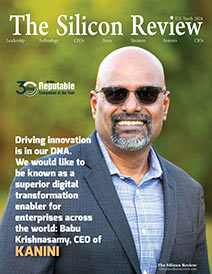Immunotherapies for Life: Biotecnol, a Biopharmaceutical Company Developing Highly-Specific Antibody-Based Immunotherapies
The Silicon Review
![]() Immuno-oncology is a rapidly evolving and complex field that offers great potential to deliver substantial benefits to patients with a range of different cancers. A number of approved therapies already exist that offer impressive and long-lasting responses in some patients.
Immuno-oncology is a rapidly evolving and complex field that offers great potential to deliver substantial benefits to patients with a range of different cancers. A number of approved therapies already exist that offer impressive and long-lasting responses in some patients.
Biotecnol is working in this field of immuno-oncology and is using proprietary antibody-based technologies to engineer and develop highly- targeted therapeutic products which utilize a patient’s own immune system to fight cancer. These powerful approaches are based on directing or modulating a patient's own T-Cells or NK-Cells to kill the tumors. This T and NK white blood cells are the most potent killing-cells of the human immune system. Other strategies being developed by Biotecnol include means to modulate key immune-checkpoint regulators for manipulating endogenous anti-tumor immunity, again using the patient's own immune system.
Biotecnol engineers Tribody molecules, which are multi-specific antibody products i.e. highly specific and highly directed molecules with more than one function. As a result a Tribody™ molecule is characterized by an unsurpassed versatility and ease of manipulation; they are engineered to incorporate up to three different specific binding sites (imagine as an analogy, "3 specific magnets" engineered and linked together in one single unit, with selectivity to a "specific metal" of your choice) which when assembled, can combine different immunological and targeting function. For example they have the ability to recruit potent immune-effector cells like T-cells or NK-cells whilst retaining the ability to direct them to the tumor by target with high precision, more than one "epitope", (which is a binding site in a tumor cell), or more than one target antigen (a biological marker expressed by a cancer cell) in the same tumor, all with one single molecule. These approaches are powerful tools to address the treatment of highly heterogeneous and highly aggressive tumors.
Biotecnol’s efforts and resources are focused on the generation of a high-value proprietary pipeline of immune-oncology drugs to treat cancers with high unmet need. These include thoracic cancers such as malignant mesothelioma, small-cell lung carcinoma (SCLC) and non-small cell lung cancer (NSCLC), for which survival remains very low, triple negative breast cancer (TNBC) and kidney cancer.
Clinical research in oncology has evolved significantly over the last 5 years. Novel protocols using combination therapies of a variety of novel biological and traditional chemical agents have shown great promise in managing survival in cancer patients. Biotecnol’s strategy is to work with top cancer institutions in the immune-oncology field which will help the company to accelerate the development of cutting-edge therapeutic approaches to fight cancer, especially in solid tumors, an area which is in great demand for effective products.
Tribody Technology
The Tribody™ technology enables the generation of multi-specific antibody products. This unique technology overcomes the key shortcomings of conventional mono- as well as of currently developed bi-specific antibody formats. With the Tribody™ technology, Biotecnol can engineer and assemble recombinant antibodies in a rational manner in order to design a chosen mechanism of action to address the killing of a specific tumor type. An anti-CD3 antibody which binds the T-cells is engineered in the Tribody™ "scaffold" where additional tumor antigens are also engineered. The Tribody then crosslink tumor antigens and T-cells to initiate the tumor-cell killing process.
Tribody™ molecules are generated via the natural in vivo heterodimerization of Fab fragments to form a scaffold (the process carried out in just one reaction in vivo and there is neither chemical nor any other means of neither conjugation nor attachment), upon which three specific antibodies are incorporated. The resulting molecules are stable and easy to produce in a single batch, without the need for additional post-production reactions other than purification. Tribodies are successfully produced in standard mammalian cell technology (CHO technology) using well-established methods.
Biotecnol Trisoma
Trisoma is a high-throughput, powerful and well-controlled platform based on proprietary methods and protocols for generating and characterizing a Tribody™ candidate drug substance. The Trisoma® platform is used for the assembly, engineering, and testing of various Tribody™ molecules with various distinct properties under various structural formats with optimal stability and desired pharmacological properties in terms of bioavailability.
Under the Trisoma® platform, Biotecnol has developed a novel format known as "Targeted T-cell Engaging Agonistic Response Modifiers" or iChecks™. These products aim at improving tumor cell-dependent T-cell or NK-cell activation. The iCheck™ formats are expected to achieve a more localized immune-function activation and obtain less or no systemic toxicity, whilst having an increased therapeutic index. These are potentially safer and more effective drugs for treating highly-heterogeneous and highly-aggressive solid tumors.
Biotecnol is constantly improving on the engineering of the Trisoma® platform and its associated technology in order to build new intellectual property and optimize the characteristics of such versatile Tribody™ derived molecules.
Knowing the Leader
Pedro de Noronha Pissarra, Ph.D., Chief Executive Office: Pedro has over 20 years of experience in the Biotechnology Industry and his entrepreneurial activities are internationally acknowledged. Pedro has built over the years an extensive track-record in growing early-stage projects in healthcare.
Pedro holds a B.Sc. and a Ph.D. in Biotechnology from Kings College London (University of London). He carried out research at several institutions, including the Chemical Engineering Department of Massachusetts Institute of Technology (M.I.T.), Cambridge, USA and at the Centre for Process Biotechnology (CPB) of the Technical University of Denmark, Lyngby, Denmark. Following his Doctoral degree, he specialized in medical sciences and oncology. After his Postdoctoral training, he undertook a 12 month Masters Programme in Management at the IC2 Institute of the University of Texas, Austin, USA.









